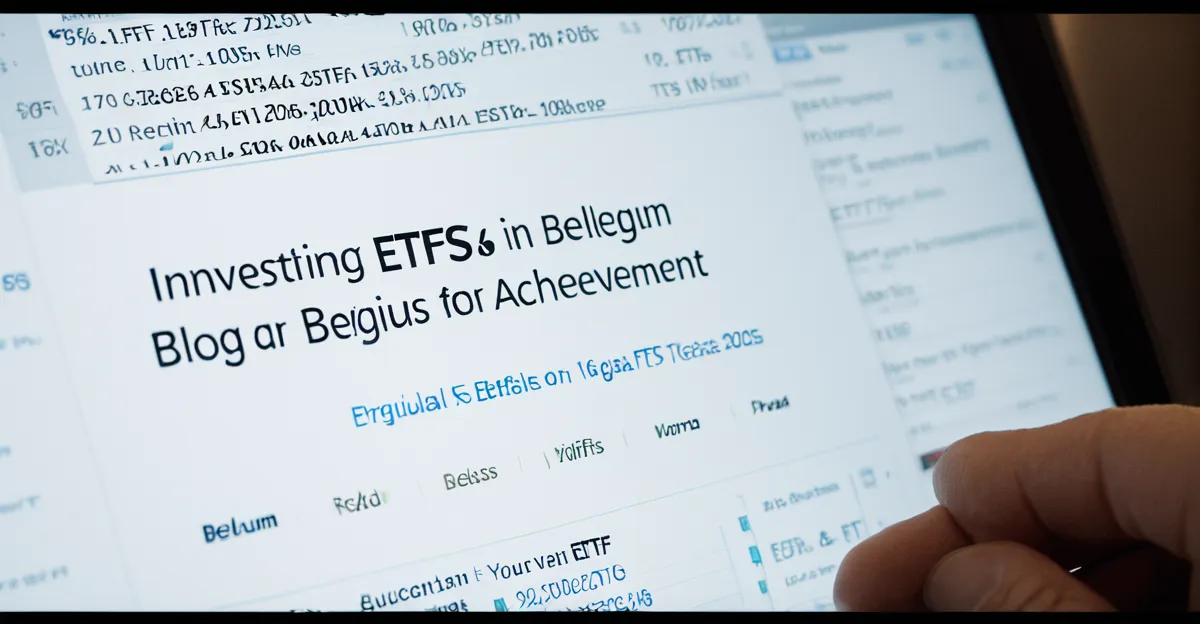Investing in ETFs offers Belgian investors simple, cost-efficient access to diversified portfolios covering local and global markets. Understanding which ETFs fit your goals, where to buy them, and the tax rules in Belgium creates a solid foundation for success in 2025. This plan highlights practical steps and key insights to help you build an effective ETF strategy tailored to today’s regulations and market opportunities.
Essential Guide to ETF Investment in Belgium for 2025
Investing in ETFs unlocks diversified, cost-effective access to global and Belgian markets for all types of investors, and Easyvest makes starting simple even for beginners. ETFs, or Exchange-Traded Funds, work by tracking a specific index—such as the BEL 20—so you simultaneously invest in dozens of companies with a single trade. This approach represents passive investing, aiming to match, not outperform, market returns. For most investors in Belgium, this method delivers a strong risk-reward balance and avoids the steep fees often seen in active fund management.
In the same genre : How do mortgage types impact property finance decisions in the UK?
Buying ETFs is straightforward: you can use brokers and banks popular with Belgians including Degiro, Bolero, and Keytrade Bank. These platforms offer a broad selection, clear transaction fees (as low as €2.50 per trade with some services), and robust digital interfaces suitable for low-cost and flexible investing.
To choose the right ETF, compare the total expense ratio, the liquidity of the fund, and tax efficiency. Seek broad, global, or sector-focused ETFs to balance your portfolio, then monitor local tax implications—such as favorable treatment for accumulating funds—when shaping long-term strategies.
Also to discover : Top tips for selecting a financial advisor in great yarmouth
Taxation, Regulation, and Practical Considerations for ETF Investors
ETF taxation rules in Belgium are essential for structuring an efficient investment strategy. Capital gains tax on ETFs is generally not levied for Belgian residents, meaning gains realized from selling ETF units—outside specific exemptions involving bonds—are tax-free in most cases. However, dividends from ETFs are subject to a 30% withholding tax, impacting investors who prefer distributing ETFs rather than accumulating ones. Accumulating ETFs (those that reinvest dividends) often prove more tax-efficient for Belgian residents, especially under the current tax treatment of ETFs in 2025.
Belgian regulations on ETFs offer strong investor protection, ensuring transparency in fund structures and cross-border compliance under European directives. Investors benefit from rigorous oversight, both at the fund level and within platforms operating under Belgian financial regulation of ETFs. ETF tax reporting and the legal framework require clarity when holding foreign ETFs, as cross-border investment can introduce additional reporting obligations.
Fees and commissions for ETFs in Belgium vary across trading platforms. ETF trading commissions and ongoing fund charges (TER) are crucial to consider alongside the broader cost efficiency of ETF investment in Belgium. Comparing platforms can reveal differences in access, reporting, and total fees, supporting a more informed, tax-efficient ETF investing approach.
Diversification, Portfolio Construction, and 2025 Investment Trends
ETFs for portfolio diversification Belgium are vital for spreading risk and enhancing returns. Experts commonly suggest an ETF portfolio allocation Belgium like this: 40% in broad global ETFs, 20% in European bonds, 20% in emerging markets, and 20% in sector ETFs focusing on areas such as technology or healthcare. This structure uses a mix of equity and bond ETFs, strengthening resilience across economic cycles. ETF sector exposure Belgium enables investors to select allocations tailored to their outlook, for example, targeting AI or renewable energy.
In 2025, investing strategies ETFs Belgium are seeing a rise in sustainable ETFs Belgium and sector ETFs Belgium. These trends reflect investor demand for environmental, social, and governance considerations, as well as for funds aligned with technology and green energy. Monitoring top performing ETFs in Belgium involves reviewing ETF performance metrics Belgium, such as year-to-date returns, risk-adjusted returns, and tracking error.
Key risk factors ETFs Belgium include market risk, liquidity risk, currency fluctuations, and tracking error. Modern portfolio tools and platform features help investors measure these risks, optimising portfolio construction and aligning with long-term Belgian market trends.









